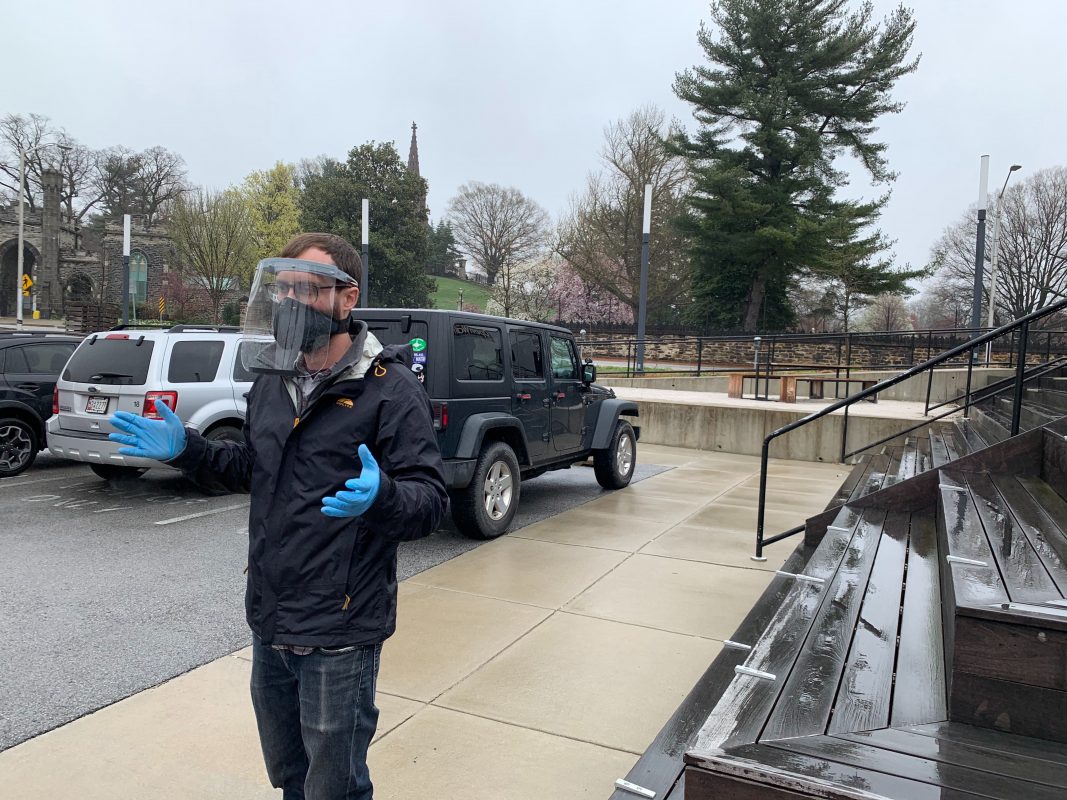
Outside Open Works in Station North on Monday afternoon, Will Holman, the makerspace’s executive director, fielded questions from reporters while practicing social distancing. Standing six feet away, Holman sported the protective face shields that Open Works has been manufacturing for medical professionals in need as they continue to treat patients amidst the spread of coronavirus.
For Holman, the project serves as a way to lend a hand to the community while also keeping himself and his fellow artists afloat.
“With the government’s announcements, facilities like ours had to close,” Holman says. “Our revenue cratered and we had to cancel classes and events. We had to furlough all of our part-time staff, and our philanthropic support has been frozen because a lot of companies are having challenges themselves.”
To create the shields, which Open Works is hoping to sell to medical providers for $8 each, the organization worked off a design from Czech company Prusa Labs, collaborated with social entrepreneurial incubator Innovation Works for help with distribution, and worked with We the Builders, which is assisting in cataloguing the product and maker signup.
Recognizing hospitals’ and health care providers’ need for masks and protective face guards, Holman and his team have outsourced work to those with 3D printers across the state to assist with production. It takes the printers anywhere from four to eight hours to complete their parts, which are either delivered or shipped to Open Works.
Production truly is a collaborative effort, with the army of printers making parts of the top and bottom of the shield, and Open Works shaping the glass on its laser cutters. Together, the makers hope to produce 500 per day.
“We’ve been working 16 to 20 hours days,” Holman says. “We’re just trying to ride this wave of momentum.”
In a time when demand outweighs supply, efforts like these have sprung up across the Baltimore area. Celebrity designer Christian Siriano, a native Marylander and Baltimore School for the Arts alumnus, led the charge last week when he began designing masks for those in need in New York City. As the virus continues to spread, local artisans with the means to help are following suit, contributing any way they can.
Local designer Jill Andrews has adopted a similar spirit with the current operations at her bridal shop, Jill Andrews Gowns. Andrews has partnered with local makers such as Words with Boards’ Kim Strassner to produce a high-end mask that can fit over the top of the N95 surgical masks used at hospitals. They are selling their masks for $15.99, with additional plans to give some away for free.
“Artisans are a close-knit group,” says Andrews, who hopes to work with home tailors and seamstresses to produce as many as 500 masks per day. “We’re all very well-connected.”
Though the coronavirus outbreak remains uncharted territory for many, Andrews has previous experience creating protective medical garments. She once participated in a Johns Hopkins Hackathon, in which she helped design a suit that won a $1.7 million United States Agency for International Development (USAID) grant for Johns Hopkins to produce ebola suits that are now made in bulk by Dupont.
“We’ve done six months of work in two days,” Andrews says of the mask production. “We’re still figuring things out.”
Laurel Porter, a teacher at Charles Carroll Barrister Elementary in Pigtown, has also taken matters into her own hands. While she may not have the power of an organization behind her, she did not want to stand idly by in the midst of the pandemic.
“In times like these, when it doesn’t seem like there’s much you can do and it feels like there’s a lot out of your control, it’s really gratifying to find something that you have a skill set for that you feel like is helping,” Porter says.
On Sunday, Porter posted to Facebook about her interest in starting a mask-making project, and immediately heard from multiple healthcare providers in Annapolis and at the University of Maryland Medical Center about their need for the masks. She began sewing them herself—she’s made around 10 thus far—using materials donated by neighbors.
While Porter learned to sew from her mother and received her sewing machine as a bridal gift, she says she never anticipated using it for this purpose. “It’s hilarious for me to think about,” she adds.
Another local DIY artisan leading the charge is Christina Brunyate, owner of Domesticity fabric shop in Lauraville. Using her vast rolodex of contacts ranging from sewers to fabric providers, Brunyate has assumed a facilitator role for those who are willing to help out.
“If you’re going to have a group of people to help with something, the sewing community—which is very gung-ho about sewing—are always going to be kind and considerate and care about others,” Brunyate says. “How often are you asked to use your sewing skills for something?”
In the past few days, Brunyate has become an information hub for those inquiring about obtaining and creating masks. She’s fielded 200 messages of all kinds, even amending her voicemail to contain specific instructions for those interested in lending a hand. She’s also giving out free elastic, as well as selling discounted fabric and scraps to ensure that masks get to the hospitals that need them.
“There’s enough need coming from different places, and enough people reaching out, that I’ve told people to keep making masks,” Brunyate says. “We’ll find a place for them.”
Over the past week, there have been suggestions that efforts like these are similar to what would be prevalent in times of war. Those in the position to give back have taken an all-hands-on-deck approach, diverting their attention to something impactful while social distancing.
“It feels great to be able to focus on something,” Holman says. “It’s why so many people have come out of the woodwork to help. This is an unprecedented national emergency. It’s emotional—I’m shell shocked at the way the community has come together.”